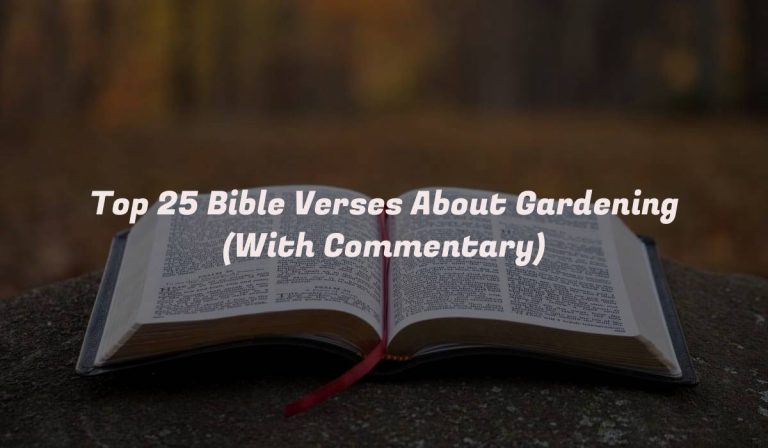25 Bible Verses About Not Giving Up On A Relationship (With Commentary)

Relationships can be challenging, but perseverance is key. Today, we’ll explore Bible verses that provide encouragement and guidance for those facing difficulties in their relationships, inspiring them not to give up.
Bible Verses About Not Giving Up On A Relationship
1 Corinthians 13:4-7
“Love is patient, love is kind. It does not envy, it does not boast, it is not proud. It does not dishonor others, it is not self-seeking, it is not easily angered, it keeps no record of wrongs. Love does not delight in evil but rejoices with the truth. It always protects, always trusts, always hopes, always perseveres.”
This verse reminds us of the qualities of true love, which include patience, kindness, forgiveness, and perseverance. In a relationship, it is important to not give up easily but to demonstrate these characteristics and continue to love and support each other.
When faced with challenges or conflicts, it is crucial to remember that love is not self-seeking but seeks the best for the other person. It requires putting aside pride and ego, and choosing to communicate, understand, and work through the difficulties together.
Proverbs 24:16
“For though the righteous fall seven times, they rise again, but the wicked stumble when calamity strikes.”
This verse encourages us to persevere even when we face challenges or setbacks in our relationships. It reminds us that the righteous, those who seek to do what is right and follow God’s ways, will rise again despite their failures.
In the context of a relationship, this verse teaches us that failures and mistakes do not have to be the end of the story. Instead, they can serve as opportunities for growth, reconciliation, and a stronger bond if we choose to learn from them and keep pressing forward.
Romans 12:12
“Be joyful in hope, patient in affliction, faithful in prayer.”
Being joyful in hope means not allowing despair or discouragement to overcome us, but instead maintaining a positive outlook for the future of the relationship. We should remain patient in times of affliction or trials, understanding that they can strengthen our bond and bring us closer together if we endure them with faith and grace.
Remaining faithful in prayer is instrumental in seeking God’s wisdom, guidance, and healing in our relationships. It allows us to rely on His strength and trust in His plans, even when things seem difficult or uncertain.
Proverbs 3:5-6
“Trust in the LORD with all your heart and lean not on your own understanding; in all your ways submit to him, and he will make your paths straight.”
Trusting in the Lord means acknowledging that His ways are higher than our own and relinquishing control to Him. It requires us to have faith and believe that He is working for the good of our relationship.
By submitting to God in all our ways, we choose to align our actions, decisions, and desires with His will. When we surrender our relationship to God, He promises to guide us on the right path, leading to an abundant and fulfilling relationship.
Matthew 19:6
“So they are no longer two, but one flesh. Therefore what God has joined together, let no one separate.”
This verse emphasizes the sanctity and permanence of marriage, once two people have become one flesh. It serves as a reminder that God is the one who unites couples in holy matrimony, and therefore, no one should try to separate them.
In the context of a relationship, this verse highlights the importance of commitment and the need to work through challenges rather than giving up. It encourages couples to place their faith in God’s ability to mend and strengthen their bond even in the face of difficulties.
Colossians 3:13
“Bear with each other and forgive one another if any of you has a grievance against someone. Forgive as the Lord forgave you.”
Forgiveness is an essential aspect of any enduring relationship. This verse reminds us to bear with one another’s faults and to be quick to forgive when someone hurts us or makes mistakes.
Just as God forgives us unconditionally, we are called to extend the same grace and forgiveness to our partners. This act of forgiveness fosters reconciliation, growth, and the restoration of trust within the relationship.
Ephesians 4:2
“Be completely humble and gentle; be patient, bearing with one another in love.”
This verse highlights the importance of humility, gentleness, and patience in a relationship. It encourages us to treat one another with kindness, respect, and understanding, even during challenging times.
By practicing humility, we avoid becoming prideful or self-centered, and instead, prioritize the well-being of our partner. This attitude of selflessness creates a healthier and more harmonious environment within the relationship.
1 Peter 4:8
“Above all, love each other deeply, because love covers over a multitude of sins.”
Deeply loving one another means seeing past the flaws and mistakes of our partners and instead focusing on their inherent value and worth. It involves extending grace, compassion, and forgiveness to each other, understanding that we all fall short.
When we choose to love deeply, our hearts are softened, and we become more willing to work through difficulties and resolve conflicts. This love has the power to overcome and heal the wounds that may arise in the course of a relationship.
Proverbs 17:17
“A friend loves at all times, and a brother is born for a time of adversity.”
Friendship is a foundational aspect of any successful relationship. This verse highlights the importance of unconditional love and support, regardless of the circumstances.
In times of adversity or challenges, a true friend and partner will stand by your side, offering encouragement, guidance, and a listening ear. Building a relationship on the solid foundation of friendship creates a bond that can weather any storm.
1 Peter 3:7
“Husbands, in the same way, be considerate as you live with your wives, and treat them with respect as the weaker partner and as heirs with you of the gracious gift of life, so that nothing will hinder your prayers.”
This verse specifically addresses husbands, reminding them to treat their wives with consideration, respect, and honor. It emphasizes the importance of recognizing the equal value and worth of both partners in the relationship.
By embracing equality and mutual respect, husbands can create an environment that fosters open communication, emotional safety, and a shared sense of purpose. This ultimately leads to a stronger and more fulfilling relationship.
Proverbs 15:1
“A gentle answer turns away wrath, but a harsh word stirs up anger.”
The way we communicate in a relationship has a significant impact on its well-being. This verse encourages us to respond with gentleness, kindness, and compassion, even in moments of conflict or disagreement.
When we choose to respond gently, we diffuse tension and allow room for understanding, empathy, and reconciliation. However, responding with harsh or hurtful words only escalates the conflict and damages trust within the relationship.
Proverbs 12:18
“The words of the reckless pierce like swords, but the tongue of the wise brings healing.”
Our words can either build up or tear down a relationship. This verse reminds us of the power our words possess and calls us to use them wisely and with care.
Wise words, spoken with love and empathy, have the potential to bring healing and restoration. On the other hand, reckless or hurtful words can cause deep wounds that take time to mend. Therefore, it is crucial to choose our words thoughtfully and seek to speak life into our relationships.
1 Corinthians 7:3-5
“The husband should fulfill his marital duty to his wife, and likewise the wife to her husband. The wife does not have authority over her own body but yields it to her husband. In the same way, the husband does not have authority over his own body but yields it to his wife. Do not deprive each other except perhaps by mutual consent and for a time, so that you may devote yourselves to prayer. Then come together again so that Satan will not tempt you because of your lack of self-control.”
This passage highlights the importance of mutual sexual intimacy and the need for both partners to fulfill their marital duties to one another. It emphasizes the concept of sacrificial love within the marital relationship.
Sexual intimacy is a vital aspect of a healthy marriage, providing connection, bonding, and fulfillment for both partners. This passage reminds us not to neglect or withhold this important aspect of the relationship, except by mutual agreement and for specific reasons.
Genesis 2:18
“The LORD God said, ‘It is not good for the man to be alone. I will make a helper suitable for him.’”
God created human beings as relational beings. This verse reveals that it is not good for us to be alone but to have a suitable partner as a companion and helper in life.
It acknowledges the benefits of having a partner in navigating life’s challenges, sharing joys and sorrows, and providing mutual support. This verse emphasizes the importance of relationships and encourages us to appreciate and invest in the relationships we have.
Proverbs 18:22
“He who finds a wife finds what is good and receives favor from the LORD.”
This verse applies to both men and women in the context of finding a suitable spouse. It recognizes that finding a life partner is a blessing from God and a source of favor.
It affirms the positive impact a healthy and loving relationship can have on our lives. Recognizing the favor that comes from having a life partner encourages us to cherish and value our relationships, seeking to nurture and grow them in accordance with God’s design.
2 Corinthians 6:14
“Do not be yoked together with unbelievers. For what do righteousness and wickedness have in common? Or what fellowship can light have with darkness?”
This verse addresses the importance of being in a relationship with someone who shares the same faith and values. It warns against the challenges and potential conflicts that can arise when two people follow different belief systems or moral standards.
Being yoked together means being deeply connected and united in purpose. In a marital or committed relationship, being yoked together with an unbeliever can create tension and hinder spiritual growth for both individuals. Therefore, it is advisable to seek a partner who shares the same faith and values.
Mark 10:9
“Therefore what God has joined together, let no one separate.”
Similar to the verse mentioned earlier in Matthew 19:6, this passage reaffirms God’s intention for marriage and emphasizes the sacredness and indissolubility of the marital union.
It emphasizes the importance of commitment and perseverance in a relationship. When God joins two people together, it is not meant to be taken lightly. It reminds us of the need to fight for our relationships, seek God’s guidance, and trust in His ability to restore and strengthen the bond.
Matthew 5:23-24
“Therefore, if you are offering your gift at the altar and there remember that your brother or sister has something against you, leave your gift there in front of the altar. First, go and be reconciled to them; then come and offer your gift.”
This verse highlights the importance of reconciliation and resolving conflicts quickly within a relationship. It teaches us that it is crucial to actively seek forgiveness and reconciliation when there is a rift between us and our partner.
Before we can fully worship God, it is necessary to make amends and strive for peace within our relationships. This verse underscores the value of humility, forgiveness, and proactive communication as we work to maintain healthy and vibrant relationships.
Matthew 22:39
“And the second is like it: ‘Love your neighbor as yourself.’”
Though this verse is often interpreted in the context of loving others generally, it is equally applicable to our relationships. It reminds us to extend love, grace, and kindness to our partners just as we would want to be treated.
By demonstrating love and empathy towards our partners, we foster an environment of mutual respect and care. This verse serves as a reminder to prioritize the needs, well-being, and happiness of our partner alongside our own.
Galatians 6:2
“Carry each other’s burdens, and in this way you will fulfill the law of Christ.”
A strong relationship is built on mutual support and understanding. This verse encourages us to be there for our partners in times of need or difficulty, sharing their burdens and helping to carry them.
By willingly supporting one another, we fulfill Christ’s command to love one another and demonstrate the sacrificial love He showed us. This verse calls us to be active listeners, compassionate companions, and dependable partners in the journey of life.
Proverbs 27:17
“As iron sharpens iron, so one person sharpens another.”
This verse highlights the importance of accountability and growth within a relationship. It emphasizes that the interactions and challenges we face with our partner can lead to personal growth and refinement.
In a healthy relationship, we sharpen one another through honest feedback, constructive criticism, and challenging each other to become the best versions of ourselves. This verse encourages us to embrace this process of growth and refinement, trusting that it leads to a stronger and more fulfilling relationship.
1 John 4:8
“Whoever does not love does not know God because God is love.”
This verse reminds us of the true source and nature of love. Love is not merely an emotion or feeling, but it is rooted in the character of God Himself.
In a relationship, it is important to understand that love is not based on our own strength or ability, but it flows from God. By seeking Him and allowing His love to guide our actions and decisions, we can better love our partner and experience the depth of love that comes from our connection to God.
1 Corinthians 16:14
“Do everything in love.”
This simple yet powerful verse encapsulates the essence of a Christ-centered relationship. It encourages us to live out our daily lives, make decisions, and interact with others, including our partner, in a spirit of love.
Doing everything in love means acting with kindness, respect, and selflessness in all aspects of the relationship. It means choosing love over pride, forgiveness over grudges, and mercy over judgment. By embodying this principle, we create an environment that nurtures and strengthens our relationships.
1 Corinthians 13:13
“And now these three remain: faith, hope, and love. But the greatest of these is love.”
This verse concludes the famous “Love Chapter” in Corinthians and reminds us of the enduring nature and supreme value of love in our relationships.
Love holds the foundation for any successful and long-lasting relationship. It encompasses faith and hope, providing the motivation, trust, and optimism needed to face the challenges that come our way.
As believers, we are called to prioritize and cultivate love within our relationships, recognizing it as the greatest virtue and the driving force that sustains and empowers our connections.
These Bible verses provide insight and guidance for not giving up on a relationship. They emphasize the importance of patience, forgiveness, communication and understanding, perseverance in the face of challenges, and having faith in God’s plan for our relationships. These verses remind us to love deeply, treat one another with kindness and respect, offer support and carry each other’s burdens, and prioritize God in our relationships. By adhering to these principles and relying on God’s wisdom and grace, we can strengthen and nurture our relationships, ultimately leading to greater fulfillment and happiness.
What Does the Bible Say About Not Giving Up On A Relationship?
In the Bible, we are encouraged to persevere in our relationships, especially in marriage. The book of Ephesians advises us to “submit to one another out of reverence for Christ” (Ephesians 5:21). This means that we are called to honor and serve each other within our relationships, particularly within the context of marriage.
When facing difficulties in a relationship, the Bible reminds us to bear with one another and forgive as the Lord forgave us (Colossians 3:13). We are also called to love unconditionally, as 1 Corinthians 13 describes: “Love is patient, love is kind. It does not envy, it does not boast, it is not proud. It does not dishonor others, it is not self-seeking, it is not easily angered, it keeps no record of wrongs” (1 Corinthians 13:4-5).
Ultimately, the Bible teaches us to pursue reconciliation and seek to restore broken relationships. In Matthew 5:23-24, Jesus instructs us to reconcile with our brothers and sisters before presenting our offerings to God. This underscores the importance of making amends and seeking restoration in our relationships.
It is important to note that while the Bible encourages perseverance and reconciliation, it also acknowledges that there are valid reasons for ending certain relationships, particularly those that are harmful or abusive. In such cases, seeking safety and well-being may require the separation from the relationship.
The Bible emphasizes the value of persevering in our relationships, seeking reconciliation, and demonstrating love and forgiveness. It reminds us that through God’s grace, we can work towards healing and restoration in our relationships.






